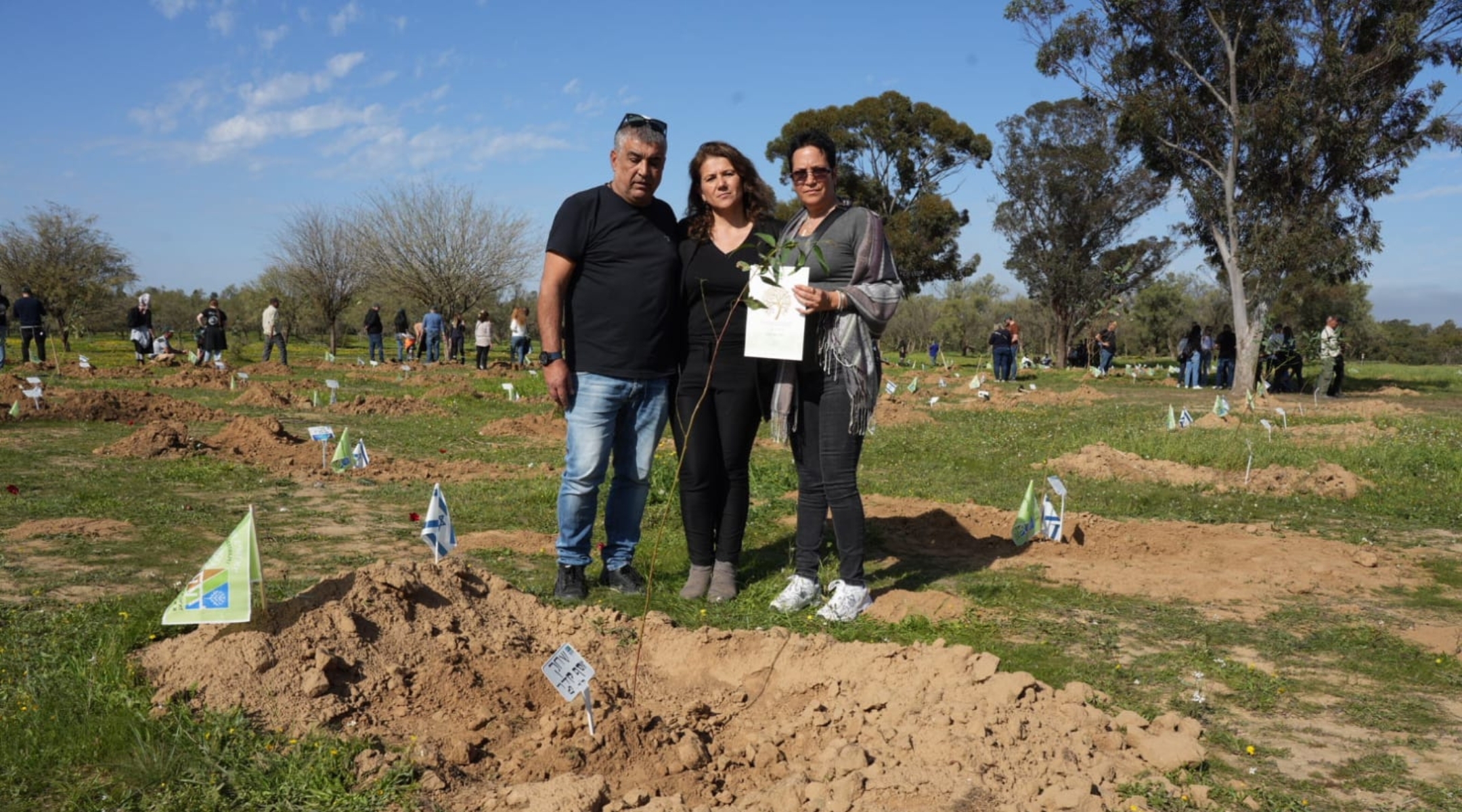‘We will rise from the dust’: Ahead of Tu BiShvat, Israelis and Jews worldwide plant trees in memory of Oct. 7 victims
Planting trees is an annual tradition on Tu BiShvat, which falls this year on Wednesday night and Thursday

KKL-JNF Chair Ifat Ovadia-Luski with Doron and Meirav Madar, the parents of Shahak Yosef Madar, who was killed on Oct. 7, plant eucalyptus trees in honor of the victims of the Re’im massacre. (Yossi Ifergan/KKL-JNF Archive)
(JTA) — On Sunday, standing on the grounds of the music festival that became a killing field, Meirav and Doron Madar planted a seedling in memory of their son.
The fledgling eucalyptus was one of 200 planted at the site of the Nova festival, where Hamas terrorists gunned down some 360 people on Oct. 7, including their 26-year-old son, Shahak Yosef Madar. Held days ahead of Tu BiShvat, the Jewish new year for the trees, the planting ceremony was one of several worldwide to pay tribute to the victims of Oct. 7 by seeding new life.
“Today, we came to plant a tree in his memory, hoping to see the tree, strong and flourishing, take root in the ground,” the Madars said at the ceremony, according to a press release.
Planting trees is an annual tradition on Tu BiShvat, which falls this year on Wednesday night and Thursday. In Jewish texts, trees usually symbolize life and strength, and in recent decades Jews have sponsored the planting of trees in Israel via the Jewish National Fund, which sponsored Sunday’s ceremony. The eucalyptus in particular has become a symbol of Israeli persistence that was immortalized in a 1962 song by Naomi Shemer.
But, as in Sunday’s ceremony, trees have been planted to commemorate Jewish death as well as life. Gardens in a number of Jewish communities memorialize the Holocaust, and a garden at Yad Vashem, Israel’s Holocaust museum, pays tribute to non-Jews who rescued Jews from the Nazis, commonly referred to as “righteous gentiles.”
Sunday’s ceremony, held at Kibbutz Reim, where the massacre occurred, included approximately 1,000 relatives of the Nova victims, including Ricarda Louk, the mother of German-Israeli tattoo artist and influencer Shani Louk.
“The pain of the grieving families is the pain of the entire Israeli people, and we stand with them throughout the way,” KKL-JNF Chairwoman Ifat Ovadia-Luski said in a statement. “The history of the people of Israel is not just a history of disturbances but a history of resilience. On Tu BiShvat, we convey a message of renewal and hope: we will rise from the dust and grow new lives in Reim and all-around Israel.”
Zo Artzeinu — an organization that began as a right-wing activist movement and has since shifted its focus to planting trees in Israel — created a campaign to plant 12,000 fruit trees in Kibbutz Nahal Oz, a Gaza border community that was ravaged on Oct. 7. The figure amounts to roughly 10 trees for every victim of the Hamas attack.
“Thousands of New mitzvot will come from these Fruit Trees and their Fruits,” said a statement on the Zo Artzeinu website, which added that the planting of the trees would elevate the souls of the victims. “Together, we’ll create NEW Life!”
Some Jewish schools and synagogues in the United States have also taken Tu Bishvat as an opportunity to commemorate the Oct. 7 victims.
Congregation B’nai Harim, a Reform congregation near Sacramento, is also fundraising for JNF, with the goal of raising $500 to plant 100 trees in Israel in memory of those killed. And middle school students at the Joseph Kushner Hebrew Academy in Livingston, New Jersey spent Jan. 16, the 101st day since Oct. 7, reciting psalms and the name of each hostage, then writing “wish letters” describing their hopes for the hostages and Israel’s soldiers.
The letters will be displayed in Hostage Square in Tel Aviv, named in honor of the Israelis held captive by Hamas, as part of a government-sponsored “Tree of Wishes” sent in by children around the world.
This article originally appeared on JTA.org.















